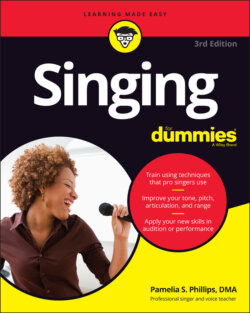Читать книгу Singing For Dummies - Pamelia S. Phillips - Страница 64
Catching a quick breath
ОглавлениеYour song may have a long phrase and then a very short rest to catch a breath. The struggle is to get in enough air in a short time. To understand how to catch a quick breath in your song, you want to know how to quickly open your muscles. If you opened the muscles slowly in the preceding exercise, you may be ready to open them quickly. Try this exercise to explore a catch breath.
Get yourself slightly winded by running in place, dancing around, or doing any other movement that gets you moving. When you start to breathe faster and get winded, stand and sing part of your song. Your body really wants to inhale. When you finally take a breath, notice how the breath drops quickly into your body. Most people describe the sensation of the body opening quickly to get air in. It’s different from pulling in air or gasping. With a gasp, your throat is tight and you’re pulling or sucking in air. Opening the body (including your throat) helps you make a quick and quiet inhalation.
Although inhaling may be natural for everyone, you need to practice the efficient and ideal posture to inhale in order to breathe your best while singing. Correct inhalation means keeping yourself properly aligned, with your body free of tension, your throat open, and your shoulders steady to allow the most air to fall into your body. Try the following to feel the difference between incorrect and correct inhalation:
If you gasp, you can feel a tight sensation in your throat as you try to squeeze air in while your vocal cords are closed. However, if you pretend that you’re hiding and don’t want anyone to hear you breathing, you leave your throat open and can take in plenty of air.
If you inhale and intentionally raise your shoulders or chest, you can feel that, as your shoulders rise, your neck gets tense. However, if you keep your shoulders and chest steady and inhale, you get more air into your body.
You may be tempted to push down the tongue as you inhale. You may feel like pushing down the tongue helps you get the air in faster, but it doesn’t. To help release any tension in your tongue as you inhale, release the tongue forward. Your tongue then moves forward, or toward your teeth, as you inhale instead of pushing back or pressing down. Compare the two. Push down your tongue as you inhale, and then try releasing your tongue forward as you inhale. You may find that the release forward helps you get the air in quickly and has your tongue released to start the first note.
Inhaling efficiently should now be fairly easy for you. Singing “Happy Birthday” tests your ability to inhale correctly and then sing a song. Before you start the song, feel the breath moving into your body. When you’re in the groove, go for it.
1 Sing all the way through the song “Happy Birthday.”
2 Take a deep breath and sing the first phrase again.
3 Pause.Before you sing the second phrase, remember all that you recently discovered about inhalation. Take your time and find the efficient and ideal posture to take in that inhalation. You don’t have to rush.
4 Calmly take the breath back in.
5 Take the time to find the correct motion of the breath on the inhalation and then sing the next phrase.
6 Repeat this series of steps until you finish the song.Remember to get the breath right instead of rushing to the next phrase or gasping for air.
Each time you try this exercise, it gets easier. Try it the next time you sing a new song to coordinate your breathing properly.
You’re not alone if you feel like you can’t remember how to breathe. Your body gets confused putting all this information into practice, so just work on the inhalation until it’s easy for you; then move on to another exercise. Go back and reread the explanation about how the breath works in the body, and then try some of the exercises again. You may find that they’re easier now that you can picture the movement of the air as well as feel it.
